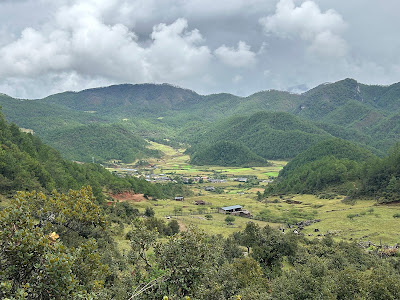If you read my account of my first trip to Muli, now more than 30 years ago, you will know that my first port of call once I 'walked off the map' was a small village in the hills north east of Yongning which Rock called Lijiasun. It was a couple of hours hiking from the hot springs near Yongning and back then it was a very primitive place of log cabins inhabited by rough-looking Mosuo, Naxi and Mongol people. No electricity or roads, and very few amenities such as running water. It reminded me me of the medieval village in Monty Python's Holy Grail - subsistence farmers literally living in mud.
I was to visit Lijiasun again in about 2004, when it was little changed, ie still very primitive.
So it was interesting to revisit Lijiasun (now known as Lijiaju 利家咀) a couple of weeks ago and find it transformed into a kind of Eco-Ethnic Holiday Village, now billed as "Lijiazu - the last Daba Matriarchal Heritage Village" tarted up and consisting of guesthouses and holiday homes, performance spaces, floral displays and with mobile phone towers powered by banks of solar panels.
What happened?
Well according to Chinese media, Lijiasun was recognised as a place of particular deprivation and isolation about a decade ago, and became the target of modernisation and poverty alleviation efforts to develop Ecological businesses an install 4G broadband services etc. It has certainly made a big impact and transformed the village.
We drive there in about an hour from Yongning along a decent road, and parked up in the village 'square' next to a stupa, with a noticeboard now inundated with announcements and signposts. There was another tourist coach in the car park and a group were roaming around, photographing everything.
We met one of the village leaders, a livewire guy who calls himself 'Black Wolf' on his WeChat account, and who took us to find one of the older villagers who might recognise some of the people I photographed 30 years ago. Uncle Du Ji - a man in his fifties - lived in an ornate old wooden 'siheyuan' - a quadrangle courtyard house with an old prayer room at the centre.
He invited us in to drink butter tea and eat walnuts, as I explained how I'd visited here before three decades ago. As I took out my phone to show him my photos, he waved it away and said "No need - I have them already". And to my astonishment he scrolled though his own phone's photo album to show me my own photos that he said he had downloaded many years ago from this blog site! At the time they were some of the few existing photos of people of that generation, he said.
"So you are the foreigner who took these pictures," he said, and proceeded to give me a rundown on who the people in the photos were - the young men staring sullenly into my camera lens, now an older businessman. The wretchedly poor people gathered round an open fire on the hillside - some now have died, bit others are still in the village, making a living in farming.
Du Ji then guided us on our main mission for the day - to identify the location where a photo of Lijiasun was taken many decades ago. We thought it was a Joseph Rock photo, but a sharp eyed villager pointed out that a child in the photo was wearing more modern clothes, possibly from the 1980s onwards.
Our photo location quest took us on a hike up the hill behind the village, where we struggled to match the exact location because there were now new buildings and a lot more overgrowth of bushes and trees where it had once been a barren hillside.
It would have been nice to stay longer in Lijiasun, but we had to move on the get to Muli the same day - and that meant a long drive over the mountain pass.





.PNG)





No comments:
Post a Comment